Posts Tagged ‘civil rights’
9月 2, 2020

Ren Hongyuan
SCHNEE, FÜR SACHAROW
In den 1970er Jahren stand Andrej Sacharow Jahr für Jahr am 7. November am Puschkin-Platz vor dem Denkmal des Dichters im Schnee. Die Silhouetten von Sacharow und von Puschkin haben sich im Schnee überlagert.
Schnee, Schnee fällt am 7. November
vor der Statue, eure Figuren, Puschkin und Du
aufeinander im Schnee, endlose Stille.
Du hörst auf dich selbst, auf den Schnee.
Du stehst im Frost, in der Weite des Schnees.
Sonne friert im Wasser, Wasser friert im Licht.
Vom Glitzern des ersten Strahls
zum Waschen der ersten eisigen Welle.
Du stehst, von Schnee zu Schnee
im tiefen Schnee, aus dem Du nicht heraussteigst.
Obwohl Wege im Schnee nach Osten und Westen
unter Deinen Füßen nicht enden, obwohl
Puschkins Augen wieder auf Deine treffen,
sieht er Dich nicht im strahlenden Schneelicht.
Was aus dem Schnee kommt, bleibt im Schnee.
Im Schnee begraben, Dein Opfer im Schnee.
Von Wasser bleibt in der Sonne nichts über
als brennender Glanz, Glitzern trifft aufeinander
auf klaren Flächen bis in die Tiefe.
Schnee im Licht unverdeckt, Schnee verdeckt nicht,
so wie die Sonne im Wasser jedes Sandkorn herauswäscht,
das Licht, das läuft und stürzt aus dem Schnee
nichts verschlingt und nicht untergeht im wogenden Strom bis ins Meer.
Schnee strömt aus Schnee, Schnee ohne Ufer.
Reinheit am Ende ist auch Vernichtung am Anfang,
reiner Schnee wird leicht zu Schneeresten, Schneescherben.
Schneetrauer gewandelt und wiedergeboren in Schnee.
Schnee flüstert weiter in endloser Stille.
So wie Wasser Sonne zurückbringt, die nicht verwelkt,
so bringt Sonne Wasser zurück, das nicht verfließt.
Ich hör Deine reine Schwermut im Schnee,
ich hör dich, die Dämmerung im Sommer ist die Weiße Nacht.
Erste Fassung 1971,
zweite Fassung 2011
Übersetzt von MW am 1. September 2020

标签:Andrej Sakharov, china, civil rights, frost, history, light, memory, Moscow, NPC, poetry, Pushkin, Ren Hongyuan, rights, russia, snow, soviet union, sun, water, world, 新世纪詩典, 任洪渊
发表在 1930s, 1937, 1940s, 1950s, 1960s, 1970s, 1971, 1980s, 1990s, 1998, 2000s, 2010s, 2011, 2020, August 2020, Middle Ages, NPC, poetry, September 2020, Translations, Uncategorized, 新世纪诗典 | Leave a Comment »
7月 29, 2018
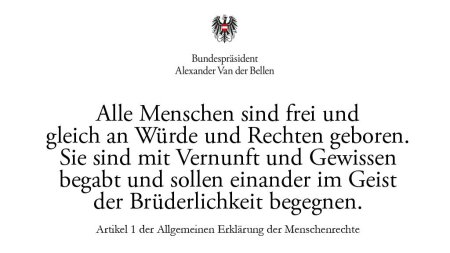
ALLGEMEINE ERKLÄRUNG DER MENSCHENRECHTE
(u.a. für den Österreichischen Bundespräsidenten Alexander van der Bellen)
.
ALLGEMEINE ERKLÄRUNG DER MENSCHENRECHTE
alle menschen sind f
alle menschen sind ff
alle menschen sind fff
alle menschen sind fffr
alle menschen sind fffrr
alle menschen sind fffrrr
ei!!!
geboren
als vogel,
als wild.
alle haben dieselben würdenträger
und die gleichen rechten
von geburt an. nicht wahr?
alle sind mit vernunft begabt
und mit gewissen,
außer dem innenminister.
sie sollen einander begegnen
in brüderlichkeit. ach ja. 1948.
nach dem krieg
nach der shoah
auch zwei chinesen waren dabei.
muss man die menschenrechte erklären?
muss man oder frau die menschen erklären?
wahrscheinlich schon immer in jeder familie
in jedem dorf oder haushalt
jeder und jedem
an jedem sonn-und feiertag,
an jedem werktag.
1948
1984
2018
2081
und so weiter in alle ewigkeit amen.
MW Juli 2018
.

.
标签:art, asia, austria, birds, birth, brotherhood, brothers, civil rights, civil society, civilians, civilization, conscience, declaration, Europe, explanation, family, game, government, history, human rights, humanity, humans, international relations, language, life, mankind, manunkind not, memory, ministers, ministry, peace, poetry, politics, president, reason, representation, representations, representative, repression, revolution, rightists, society, speech, sunday, UN, United Nations, war, work
发表在 18th century, 1930s, 1940s, 1948, 1950s, 1960s, 1970s, 1980s, 1984, 1989, 1990s, 19th century, 2000s, 2010s, 2018, 2081, 20th century, 21st century, Antique times, August 2018, July 2018, Middle Ages, Old Egypt, poetry, PR, prose, Roman times, Stone Age, Tang Dynasty, Translations, Uncategorized, Welcome! | Leave a Comment »
6月 27, 2017
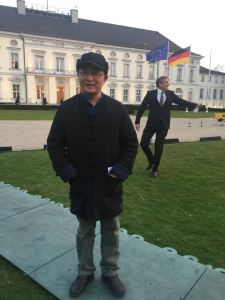
Save Nobel Peace Prize winner Liu Xiaobo!
搶救劉曉波
中國監獄使劉曉波得了絕症。
這一消息轉瞬傳遍了世界。
作為劉曉波和劉霞多年的知交,我在此呼籲:
出於基本人權,西方各國政府首腦,特別是美國、德國、法國、英國,以及歐盟政府首腦,應該敦促中國政府,盡快讓劉曉波夫婦出國就醫,不,人道搶救。
廖亦武,德國書業和平獎得主
2017年6月26日
Liao Yiwu writes:
“I know, we’re all so concerned with Turkey, Syria or that maniac in the US, and that’s alright, but it’s about to draw some attention back to human rights violations in China. Please. I do know some people personally who are or have been imprisoned in China for no crime but writing on behalf of humanistic endeavours.”
“The news that Liu Xiaobo’s time in a Chinese prison has left him terminally ill has spread across the globe.
Liu Xiaobo and his wife Liu Xia have been close friends of mine for decades. As their friend, I hereby call upon the leaders of Western governments, particularly leaders in the US, Germany, France, the UK, and the European Union, to urge the Chinese government to allow Liu Xiaobo and his wife to leave the country to seek medical treatment overseas.
This is a humanitarian imperative.”
Liao Yiwu
2012 Recipient of the Peace Prize of the German Book Trade
26 June 2017
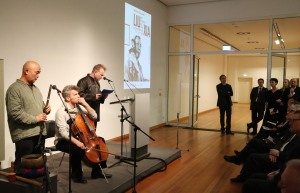
LIU XIA. Eine Fotografin aus China.
Vernissage am 10.Februar 2015.
Ausstellungsdauer: 21.Februar – 19.April 2015 m Martin Gropius Bau Berlin.
LIAO YIWU, MARCUS HAGEMANN, MARTIN WINTER
“Dies ist ein Appell an die chinesische Regierung von Herta Müller, Liao Yiwu, Ulrich Schreiber und vielen Freunden. Inzwischen haben auch Elfriede Jelinek, Eva Menasse, Madeleine Thien, Salman Rushdie, Wole Soyinka, Ian McEwan und 100 weitere Autoren aus allen Kontinenten unterzeichnet.
Nobel Peace Prize Laureat Liu Xiaobo has been diagnosed with liver cancer. His wife, Liu Xia, who has been under house arrest for several years, is also gravely ill. They have the wish to travel to Germany so they can receive medical care. Their wish to leave China is so strong that Liu Xiaobo has stated that – if he is to die – he does not want to do so on Chinese soil. Liu Xia also no longer wishes to live there. Time is running. We urge the Chinese government to grant Liu Xiaobo and Liu Xia the freedom to leave the country!
Der Friedensnobelpreisträger Liu Xiaobo ist an Leberkrebs erkrankt. Er und seine Frau Liu Xia haben hat den Wunsch geäussert, nach Deutschland auszureisen, um medizinische Hilfe für beide zu bekommen – denn auch Liu Xia, die seit Jahren unter Hausarrest steht, ist schwer erkrankt. Der Wunsch der beiden geht soweit, dass Liu Xiaobo sagt, er möchte – selbst wenn er sterben muss – nicht in China sterben. Und Liu Xia sagt, dass sie nicht länger in China leben möchte. Die Zeit ist knapp. Wir appellieren dringend an die chinesische Regierung: geben sie diesen beiden Menschen die Freiheit, das Land zu verlassen!
强烈呼吁
诺贝尔和平奖得主刘晓波身患肝癌,他和他的夫人刘霞表示希望两个人都能够来德国寻求医疗救治。因为刘霞在长期软禁中也身患重病。他们出国求医的愿望非常坚决,刘晓波表示,如果必死无疑,那也不要死在中国。刘霞表示,再也不愿意在中国生活下去了。目前时间紧迫,我们强烈向中国政府呼吁,给他们自由,让他们离开中国。赫塔.米勒 廖亦武 乌里.赛博
El Premio Nobel de la Paz, Liu Xiaobo, está muy enfermo, tiene cáncer de hígado. Tanto él como su esposa Liu Xia han expresado su deseo de poder viajar a Alemania para obtener ayuda médica para ambos. Xiu Liu, con arresto domiciliario desde muchos anos, también está muy enferma. El deseo de ambos, así lo dijo Liu Xiaobo, es tan fuerte que dice no querer morir en China – si esto es su destino inmediato, y su mujer insiste que no quiere seguir viviendo en China. El tiempo apremia, y por ello pedimos al Gobierno de China: Por favor, conceden la libertad a estas dos personas para que puedan dejar el país.
Le lauréat du prix Nobel de la paix, Liu Xiaobo, est atteint d’un cancer du foie. Lui et son épouse Liu Xia ont émis le vœu de se rendre en Allemagne afin de recevoir des soins médicaux pour les deux. En effet, Liu Xia, qui est en résidence surveillée depuis plusieurs années, est gravement malade. Leur souhait est si profond que Liu Xiaobo dit qu’il ne veut pas — s’il doit décéder — décéder en Chine. Liu Xia quant à elle dit qu’elle ne veut plus vivre en Chine. Le temps est court. Nous en appelons d’urgence au gouvernement chinois: donnez à ces deux personnes la liberté de quitter le pays.
Fredspristagaren Liu Xiaobo är sjuk i levercancer. Tillsammans med sin Liu Xia har han uttryckt önskan om att få resa till Tyskland för att där få den medicinska vård de båda behöver. Också Liu Xia, som sedan många år befinner sig i husarrest, är nämligen svårt sjuk. Liu Xiaobo säger att om han måste dö så vill han inte dö i Kina. Liu Xia säger att hon inte längre vill leva i Kina. Tiden är knapp. Vi appellerar till den kinesiska regeringen att snarast ge dessa två människor friheten att lämna landet.
O ganhador do Prêmio Nobel Liu Xiaobo está com câncer de fígado. Ele e sua Liu Xia manifestaram vontade de viajar para a Alemanha, a fim de obter tratamento médico para ambos. Liu Xia, que está sob prisão domiciliar há anos, também está gravemente doente. A vontade deles, nesse sentido, é tanta que Liu Xiaobo afirma que não deseja morrer na China, mesmo que sua condição seja terminal. E Liu Xia diz que não quer mais viver na China. O tempo é curto. Por isso, dirigimos um apelo urgente às autoridades chinesas: concedam a essas duas pessoas a liberdade para sair do país.”
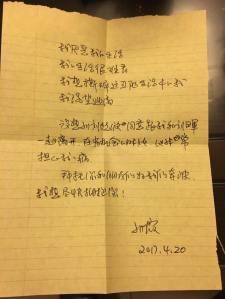
Liu Xia’s handwritten letter
廖亦武: 眼下,刘晓波夫妇已被严密控制,我不得已公布刘霞的手迹。我还有刘霞向国宝提出出国申请的手迹,暂时不便公布。媒体,以及大伙儿可以此为凭:出国治病是他们最迫切的心愿,劉曉波説死也要死在西方,千真万确!
“I am sick of my life, this grotesque life. I want to tear the version of myself who lives this grotesque life to pieces. I long to escape.
I can hardly believe that Xiaobo agreed to leave China together with me and [my brother] Liu Hui. When he finally learned about it, he was very concerned about my illness.
I am grateful to you and to our friends for everything you’ve been doing and cannot wait to embrace you.
Liu Xia
20 April 2017”
我厭惡我的生活,我的生活很難看,我想撕碎這醜陋生活中的我,我渴望逃離。
沒想到劉曉波同意跟我和劉暉一起離開,在有機會*的時候,他非常擔心我的病。
拜托你和朋友們為我們奔波,我想儘快擁抱你!
标签:1989, appeal, civil rights, dissidents, health, human rights, jail, Liao Yiwu, literature, Liu Xia, Liu Xiaobo, Nobel Peace prize, politics, prison, rights, writers, 刘霞, 刘晓波, 劉曉波
发表在 1960s, 1970s, 1980s, 1989, 1990s, 2000s, 2009, 2010, 2010s, 2017, 20th century, 21st century, prose, Uncategorized | Leave a Comment »
12月 2, 2016

GOODBYE TAIWAN!
These few days in Taiwan
meeting so many friends,
very precious time.
It has been almost 30 years
since I first was in Taiwan.
These few days we’ve met many authors
and fellow translators.
We also met the poet Hung Hung.
There are people in Taiwan
who meet Hung Hung every day,
and even Le Tian,
Hung Hung’s little child.
Le means to laugh, Tian is the sky.
Last night Le Tian got to meet me.
Holding him
was like holding my children
ten years ago.
We lived in Beijing, where they were born.
Tonight I am leaving Taiwan.
What if I could stay?
Nowadays in a few ways
Taiwan is doing better than Austria.
No resurgent Rightists.
First female president,
some social progress.
Very clear progress
since thirty years ago.
Taiwan is doing better right now
than Europe and USA.
Maybe like Canada,
although Taiwan is rather small.
Half the size of Austria.
But to be able to face your history,
to induce progress in your society,
these things are very precious indeed.
Please take care!
Hope we meet again soon!
MW November 2016
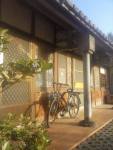
AUF WIEDERSEHEN, TAIWAN!
die paar tage in taiwan
waren so voller freunde,
sehr, sehr kostbare tage.
manche freunde kenn ich fast 30 jahre.
autoren, autorinnen hab ich getroffen,
übersetzerinnen und übersetzer,
am letzten abend den dichter hung hung.
ein paar menschen in taiwan
treffen hung hung jeden tag,
und sogar lö tiän, seinen sohn.
lö tiän bedeutet den himmel anlachen.
gestern hat der kleine mich angelacht.
lö tiän im arm halten ist wie vor jahren
meine kleinkinder halten,
vor zehn jahren in peking.
heute abend verlasse ich taiwan.
und wenn ich bleiben könnte?
taiwan geht es heute in mancher hinsicht
besser als österreich.
keine rechtsextremen im höhenflug,
die erste frau an der spitze,
fortschritte in der gesellschaft.
große fortschritte, in vieler hinsicht
auf jeden fall in 30 jahren.
heutzutage gehts taiwan besser
als der usa und europa,
vergleichbar mit kanada, eventuell,
obwohl taiwan recht klein ist.
halb so groß wie österreich.
deiner geschichte ins gesicht schauen können,
in deiner gesellschaft fortschritt erzeugen
sind sehr, sehr kostbare dinge.
passt auf euch auf, liebe freunde!
auf ein baldiges wiedersehn!
MW November 2016
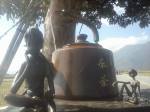
又說再見了!
這几天在台灣
碰到很多朋友
非常難得。
有的認試快三十年了。
這几天碰到很多作家
很多譯着同事
還碰到詩人鴻鴻。
在台灣有人
天天碰到鴻鴻
也碰到楽天
鴻鴻的小兒子。
昨天楽天碰到我。
抱着他像十年前
抱着自己的孩子。
那時候在北京。
今天晚上我離開台灣。
如果能留下會怎麽様?
台灣目前有些方面
比奥地利好。
没有崛起的右派。
有第一位女總统,
社會有一些進步。
總共很多方面
比三十年前進步蠻大了。
目前台灣好像比歐洲美国都好,
也许有點像加拿大,
雖然台灣很小,
半個奥地利面積。
能够面對自己的歷史,
能够促進社會改造
都非常難得的。
請朋友多保重!
希望早點再見!
2016.11.21

标签:austria, authors, beijing, canada, child, children, civil rights, democracy, elections, Europe, 鴻鴻, friendship, history, Hung Hung, language, literature, meeting, memory, people, poetry, population, president, progress, rights, size, society, taiwan, time, translation, USA, vote, writing
发表在 1947, 1950s, 1960s, 1970s, 1980s, 1987, 1988, 1989, 1990s, 2000s, 2010s, 2016, November 2016, poetry, Translations, Uncategorized | Leave a Comment »
1月 2, 2015

MOON
a slice of lemon
a slice of tangerine
a ginger cake
finally we have snow
MW Dec. 28, 2014

Yi Sha
DREAM #203
I am on an iron ladder
on the side of a tall building
I’m facing outside
stepping down slowly
outside of my dreams
I’m not at all afraid of heights
but in this dream
my hands and feet are cold with fear
I’m risking a look
down to what I call
mother earth in my poems
getting dizzy
wanting to fall, headlong
gingerly feeling my way
step by step
finally
losing my feet
but – I’m still okay
because by now
it’s not more than a man’s height to the ground
lightly and softly
my feet touching down
2012
Tr. MW, 1/1/15
伊沙
《梦(203)》
我从一座大楼
外墙的铁梯上
面朝外面
拾级而下
梦之外
绝不恐高的我
梦之内
被吓得手脚冰凉
我望了一眼
我在诗中
称之为大地的东西
头晕目眩
很想一头栽下去
举步维艰
缓缓而下
终于
还是失足坠落
但是——没事儿
因为此时的高度
只剩一人来高
我的双足
轻柔触地
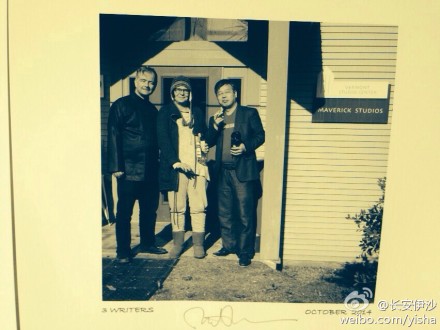
photo by Howard Romero
Li Bai
ANSWER FROM THE MOUNTAINS
why do I live in green peaks?
I laugh, my heart is at ease.
blossoms floating far adrift –
earth and sky not from this world.
8th century AD
Tr. MW, 2014
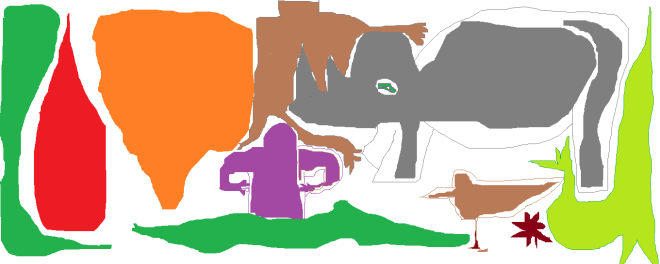
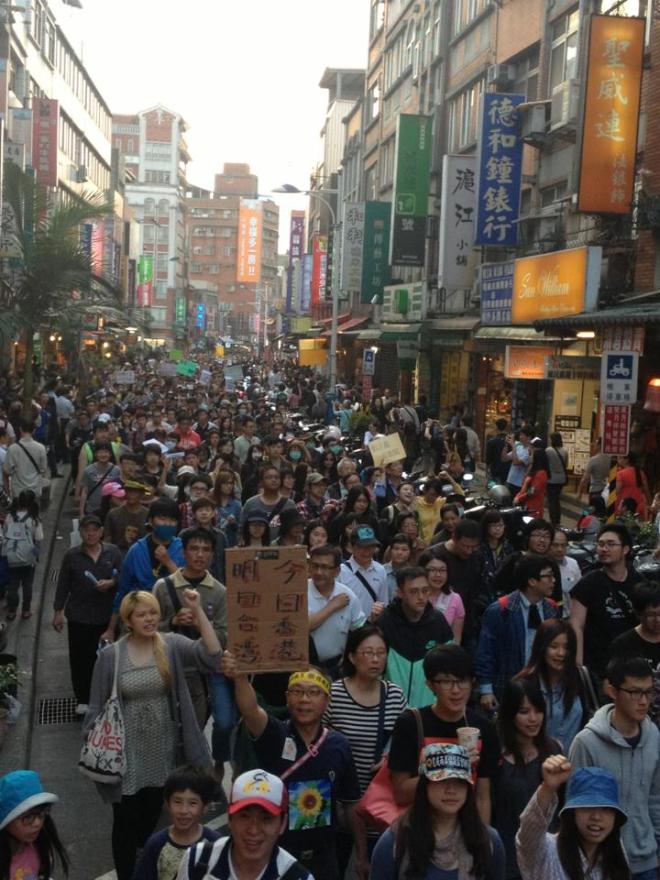
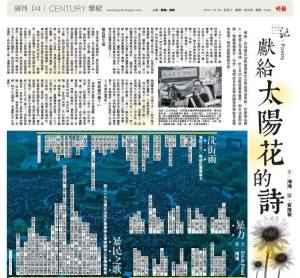
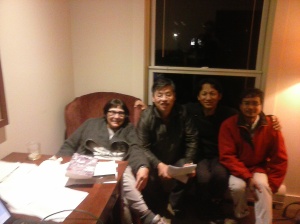
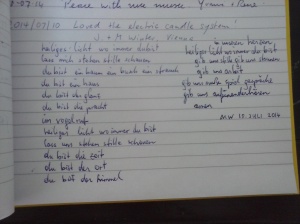
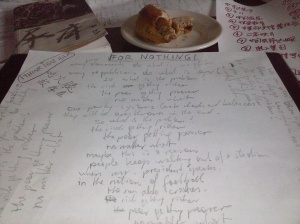 WordPress.com Stats Helper Monkey 为此博客制作了一份 2014 年度报告。
WordPress.com Stats Helper Monkey 为此博客制作了一份 2014 年度报告。

下面是一段摘要:
纽约一辆地铁可以搭载 1,200 名乘客。2014 年,此博客的浏览量约为 5,200 次。若用纽约地铁来运载这些乘客,差不多要运 4 趟。
点击此处查看完整报告。
标签:1989, art, austria, blossoms, children, china, civil rights, dreams, factory, fall, Hong Kong, Li Khin-huann, Liao Yiwu, poetry, Shen Haobo, spring, summer, taiwan, USA, winter, yi sha, 新世纪诗典, 李勤岸, 沈浩波, 伊沙
发表在 January 2015, Uncategorized | Leave a Comment »
10月 1, 2014
 After the verdict of life in jail against Ilham Tohti 伊力哈木, the Chinese writer Wang Lixiong 王力雄, who published a lot about Xinjiang, said the Chinese government had just created the Chinese Nelson Mandela. Some foreign media gleefully took up this topic, especially when the official Xinhua (New China) agency angrily denounced the suggestion. I remember when Wang Lixiong was discussed on the MCLC list not long ago. There was a zoologist who saw a quote from an essay by Wang Lixiong, maybe in the NY times. The zoologist, who had worked in China, thought Wang was fomenting racial hatred, like certain African American civil rights activists in the 1960s. Actually, Wang had tried to express the desperate anguish among Uighurs and other marginalized people in China. Ilham Tohti just got life in jail for a bunch of isolated quotes like that one from Wang Lixiong.
After the verdict of life in jail against Ilham Tohti 伊力哈木, the Chinese writer Wang Lixiong 王力雄, who published a lot about Xinjiang, said the Chinese government had just created the Chinese Nelson Mandela. Some foreign media gleefully took up this topic, especially when the official Xinhua (New China) agency angrily denounced the suggestion. I remember when Wang Lixiong was discussed on the MCLC list not long ago. There was a zoologist who saw a quote from an essay by Wang Lixiong, maybe in the NY times. The zoologist, who had worked in China, thought Wang was fomenting racial hatred, like certain African American civil rights activists in the 1960s. Actually, Wang had tried to express the desperate anguish among Uighurs and other marginalized people in China. Ilham Tohti just got life in jail for a bunch of isolated quotes like that one from Wang Lixiong.
 The struggle for civil rights and life in dignity is always within a particular society, not between countries or hemispheres. The workers in the brick kilns of Vienna’s 10th district, where we now live, were championed by Victor Adler, physician, psychiatrist and founding organizer of the Social Democrats. The great strike of 1895 resulted in one dead worker and many wounded, but also eventually in a big turn-around in conditions through a widened conscience and consciousness in the middle class. Wanting to catch up with a supposedly more progressive society or country or hemisphere helps a lot, of course. There is something like international conscience. China’s famous anarchist novelist Ba Jin protested against the death penalties for Sacco and Vanzetti, while he was in France. Many Chinese working students went to France as part of China’s engagement in the First World War. Deng Xiaoping was among them. Ba Jin 巴金, who took his pen name from the transliterations of Bakunin and Kropotkin, lived until 2005. I visited his house in Shanghai in December, it is a museum now. Ba Jin was very, very lucky to live for almost 100 years, although he was also “struggled against”. In the 1980s and 1990s, he argued for a museum about the atrocities of the 1960s. But after 1989, there was and is no hope for that kind of thing, except in small private efforts. Where did Ba Jin get his Anarchism? Were Bakunin and Kropotkin translated from Russian or from Japanese? Communism was imported into China via Japan, Prof. Qin Hui 秦晖 argued in Vienna in July at a China and First World War symposium. Along with nationalism, and the result was a radically Stalinist brand, eventually. There are complicated international economic and political implications, then and now. But still, developments in worker’s and citizens actual conditions and rights are the result of a struggle for conscience and consciousness in a particular society. Rights do not come from the barrel of a gun. When a government disappears students to frame them with the supposed crimes they did for their teacher, so they can be made to frame their teacher, and these disappeared students suddenly appear on TV, shackled in orange uniforms through prison bars, after their parents have looked for them for half a year or more, not knowing if they are still alive, and when professors from other universities declare that since it has been proven through these students and from clearly oppositional statements of the accused teacher in class and from students and other authors on a website he founded that he incites racial hatred, it is clear beyond doubt he has to be put away for life, because no society in the world would or should tolerate incitement for racial hatred after what happened to the Jews in the Second World War and so on – if Uighur students are disappeared just like that and suddenly paraded on TV and no-one asks what they are really accused of or if they were tortured, no-one asks how many months they and their teacher spent shackled in leg irons, no one asks if the government would dare to do that to Han Chinese students and professors – what am I getting at? There is a big lack of conscience and consciousness, a lot of repression. Again, this is a struggle within a particular society.
The struggle for civil rights and life in dignity is always within a particular society, not between countries or hemispheres. The workers in the brick kilns of Vienna’s 10th district, where we now live, were championed by Victor Adler, physician, psychiatrist and founding organizer of the Social Democrats. The great strike of 1895 resulted in one dead worker and many wounded, but also eventually in a big turn-around in conditions through a widened conscience and consciousness in the middle class. Wanting to catch up with a supposedly more progressive society or country or hemisphere helps a lot, of course. There is something like international conscience. China’s famous anarchist novelist Ba Jin protested against the death penalties for Sacco and Vanzetti, while he was in France. Many Chinese working students went to France as part of China’s engagement in the First World War. Deng Xiaoping was among them. Ba Jin 巴金, who took his pen name from the transliterations of Bakunin and Kropotkin, lived until 2005. I visited his house in Shanghai in December, it is a museum now. Ba Jin was very, very lucky to live for almost 100 years, although he was also “struggled against”. In the 1980s and 1990s, he argued for a museum about the atrocities of the 1960s. But after 1989, there was and is no hope for that kind of thing, except in small private efforts. Where did Ba Jin get his Anarchism? Were Bakunin and Kropotkin translated from Russian or from Japanese? Communism was imported into China via Japan, Prof. Qin Hui 秦晖 argued in Vienna in July at a China and First World War symposium. Along with nationalism, and the result was a radically Stalinist brand, eventually. There are complicated international economic and political implications, then and now. But still, developments in worker’s and citizens actual conditions and rights are the result of a struggle for conscience and consciousness in a particular society. Rights do not come from the barrel of a gun. When a government disappears students to frame them with the supposed crimes they did for their teacher, so they can be made to frame their teacher, and these disappeared students suddenly appear on TV, shackled in orange uniforms through prison bars, after their parents have looked for them for half a year or more, not knowing if they are still alive, and when professors from other universities declare that since it has been proven through these students and from clearly oppositional statements of the accused teacher in class and from students and other authors on a website he founded that he incites racial hatred, it is clear beyond doubt he has to be put away for life, because no society in the world would or should tolerate incitement for racial hatred after what happened to the Jews in the Second World War and so on – if Uighur students are disappeared just like that and suddenly paraded on TV and no-one asks what they are really accused of or if they were tortured, no-one asks how many months they and their teacher spent shackled in leg irons, no one asks if the government would dare to do that to Han Chinese students and professors – what am I getting at? There is a big lack of conscience and consciousness, a lot of repression. Again, this is a struggle within a particular society.

My translation of Liu Zhenyun’s 刘震云 “1942“ (温故一九四二)is coming out in German these days. With biting sarcasm, Liu describes the loneliness at the very top. At summit meetings, those statesmen often shake each other very warmly by the hand, or even hug and kiss each other. That’s because they are class brothers, says Liu’s narrator. They might be lonely, because nobody understands them. They would like to care for ordinary people, only there are always more pressing concerns. But they can still rest at ease, because no matter what happens, even if millions are being killed by famine and war, everyone else will be affected before them, they will always be most well protected.
The loneliness of a man or a woman who has lost everything is a very different situation from that of a government leader. Liu Zhenyun describes both in harrowing details. I asked Chen Xiwo 陈希我, the celebrated novelist whose works are banned in China, how he would compare Liu Zhenyun’s “1942“, originally written 1992-1993, to other important realist works in the 1980s and 1990s. If you compare it to Zhang Wei’s Old Ship 古船 from 1985 and Chen Zhongshi’s White Deer Plain 白鹿原 from 1993, Chen Xiwo said, the political analysis in “1942“ is the best.
The NY Times article about the students paraded on Chinese TV to denounce their teacher Ilham Tohti has a link to a blog by a student who was also disappeared and made to denounce Ilham, but then he was released late last year. It is a moving piece.
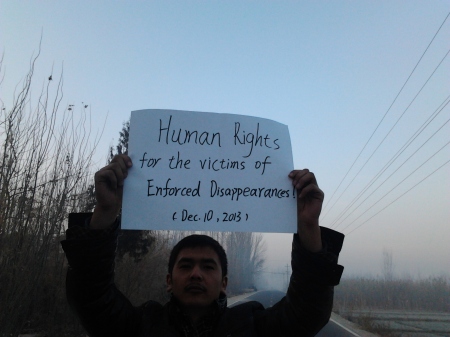
标签:chinese language and literature, Chinese Nelson Mandela, civil rights, 王力雄, 秦晖, disappearance, education, Ilham Tohti, Mandela, politics, Wang Lixiong, 伊力哈木, 伊力哈木。土赫提
发表在 September 2014 | Leave a Comment »
2月 10, 2014

This is the first news of the day. They killed a poet and civil rights activist. By order of the president, along with some others. It happened two weeks ago already. Now we have Olympics in Russia. Austrian skiers are winning, along with Putin, who is drinking Schnapps with the Austrian team. No, they didn’t kill that poet in Russia. It was in Iran. By order of the president, supposedly a reformer. I was just reading Marjane Satrapi and Guy Delisle. Iran and Jerusalem. Gaza. Nothing on China. My children are watching Teenage Mutant Ninja Turtles with breakfast. Beijing suspended up in the stratosphere. Michealangelo, Donatello, Leonardo and Raphael have to reach Tian’anmen Square on a tricycle, before it’s too late.
 Lyrikzeitung & Poetry News
Lyrikzeitung & Poetry News
Die US-amerikanische Poetry Foundation teilt mit, daß am 27.1. auf Anweisung des iranischen Präsidenten Hassan Rohani der Dichter und Aktivist Hashem Shaabani hingerichtet wurde. Laut Radio Free Europe habe ein Islamisches Revolutionstribunal ihn und 14 weitere Personen im vergangenen Juli zum Tode verurteilt, u.a. weil sie einen “Krieg gegen Gott” führten. Nach Presseberichten sei die Todesstrafe durch Hängen vollstreckt worden.
Shaabani war während seiner dreijährigen Haft schwer gefoltert worden. Human Rights Voices schreibt:
Seine Freunde kannten ihn als einen Mann des Friedens und der Verständigung, der innerhalb des despotischen Khomeinisystems dafür kämpfte, individuelle Freiheitsräume auszuweiten. In einem Brief aus dem Gefängnis, den seine Familie zugänglich gemacht hat, schrieb er, er habe nicht schweigen können, wenn Menschen willkürlich und unrechtsmäßig verurteilt und hingerichtet wurden. Er habe versucht, das Recht jeden Volkes auf ein freies Leben mit vollen Bürgerrechten zu verteidigen. “Die einzige Waffe, die ich in meinem Kampf gegen diese…
View original post 8 剩余字数
标签:civil rights, death penalty, hangings, iran, news, poetry, torture
发表在 January 2014, Uncategorized | 1 Comment »
8月 12, 2013
The Globe and Mail article quoted by Paul Manfredi is well informed and sympathetic. But it doesn’t spell out any concrete reasons for Ai Weiwei’s singular status. Ai Weiwei’s status, even after his imprisonment, is that of a “princeling”. It seems to be easier to get rid of Bo Xilai. Bo’s father was one of the “eight immortals” of the Communist Party. Ai Weiwei’s father Ai Qing was a persecuted Communist writer, persecuted under Communist rule since the 1940s. Persecuted before, that’s where he got his name. Most of his colleagues denounced each other. Among famous writers, few seem to have been as obstinate as Ai Qing. He was banished to an army town in Xinjiang, a huge city today. There he cleaned toilets, together with little Weiwei. But after Deng Xiaoping came to power in 1978, Ai Qing became an icon. Unlike Bo Xilai and his henchmen, Ai Weiwei did not build labor camps and organ-harvested Falungong-followers. Before he was arrested, Global Times had published many sympathetic articles about his civil rights activism. And even after his abduction and imprisonment at an unknown location, Ai Weiwei gets to keep his comparatively huge house and grounds and most of his fortune. If he was persecuted too much, the main reason for Ai Weiwei’s status would come out too clearly: It would be awkward to discuss his father’s fate in detail. Cultural policy since the 1940s is no secret to anybody in and around the arts in China. But still. Maybe it would come out too clearly how control over art and literature and everything connected to culture was deemed even more important than in other Socialist countries. How idealism had been betrayed again and again, most effectively with broad domestic and international participation in economic growth after 1989. Ai Weiwei is very different from his father Ai Qing in many aspects, as well from his older brother Ai Xuan, who is also a well-known artist in China. But like his father, Ai Weiwei remains an icon of idealism. It would be awkward and politically dangerous to challenge such icons too much and thus revive ideals in a big way.
The Globe and Mail article quoted by Paul Manfredi gives convincing evidence of Ai Weiwei’s civil disobedience and civil rights engagement. Another good recent piece on Ai Weiwei, his imprisonment in 2011 and comparable phenomena elsewhere around the world is a TED-talk by An Xiao Mina.
Ai Weiwei wrote an indignant indictment of the US behaviour in the Snowden case in The Guardian back in June. That was before the plane carrying Bolivia’s president was refused airspace by France, Spain and Italy on US orders on July 3.
标签:Ai Qing, Ai Weiwei, Ai Xuan, art, canada, childhood, china, civil rights, civil society, contact, culture, dialogue, Global Times, history, Japan, literature, media, memory, nation, politics, prison, repression, rights, Snowden, USA
发表在 August 2013, Uncategorized | Leave a Comment »
2月 28, 2013

photo by Sara Bernal
Chat with an old friend in Beijing who works in Chinese media. Thursday, Feb. 28, 2013 7:50 am GMT
hello dear
bonjour. 早上好。
how are you ??
還可以
你好嗎?
空氣很臭嗎?
feeling nauseated, pollution is above maximum level again
855 right now
他們兩會喘氣一點也好
disgusting
+o(
you know the article i translated a few days ago to tackle the pollution? they want to forbid the barbecues !!
*^o)
like 羊肉串?
dui !!
太可笑
可悲
the state of the air is the state of the art of ruling the country. we had a guy from shanghai here at the university yesterday, there is a un conference on middle east in the city, and he is a chinese expert on jews in china and relations to middle east. very pragmatic, realist guy, sounds like some of his israeli friends. we don’t want another libya chaos, so we veto.
😐
but who are they defending in the security council? sudan was massacring their own people. China supports any regime that suppresses their own population by military means.
yeaah, so now it is too late for the international community to shine, and the ones who help in Syria are the radical islamist, Al qaida etc..
exactly.
when the war will be over, do we really want an other country ruled by Al Qaida, because china did not want chaos ?
such short term vision
lets not forget the dearest firend poutine
such a nice guy to help his economy by boosting the weapons and jets industry
yes. the chinese love to cooperate on weapons with israel and do all sorts of research. he likes to talk about such things. but nobody asked tough questions. stephane hessel died two days ago in france, wasn’t it? the old guy who survived the nazis and inspired recent civil movements. it’s not easy. arab spring was risky. doesn’t look good now, on the whole.
yes, he passed away, just learned about it a few minutes ago, i just cried watching the news
every revolution takes time, the french one lasted more than 20 years
to really settle down
the name arab spring comes from prague spring 1968. there are always risks with popular movements for democracy from the bottom up. participation, human rights, civil rights, civil society.
but the good thing in the chaos in egypt and algeria and tunisia, is that now, people know they can make a difference, and wont take bullshit and abuse like sheep
so, all those who just had personal ambitions are aware that they too can be put down by civilians if they don t act according with the will of the people.
yes. two and a half years ago it looked like mubarak and gaddafi etc. would rule forever.
it will take time, but in the end, we, the basic people all want the same: quiet, freedom, work, and education for the kids
it was more convenient for everybody to support the status quo.
for us, china, eu, diplomats….
you are right. to be left in peace by the government, to have basic rights and freedom, to have work, and education for the kids. in tibetan. in mongolian. in uighur. etc. not very difficult.

你好吗?
不怎么好
头疼 头晕
那今天好好休息。。。
空气怃然挺厉害
没有办法休息没
http://blog.sina.com.cn/s/blog_68d111990101afbr.html
https://erguotou.wordpress.com/2012/10/09/lilis-story/
i was horrified by the story of Lili
i sent it to my friends and colleagues
it’s very disgusting. the poem is from last october. it didn’t look as if she would get justice. remarkably well-written report in the newspaper when you follow the link., very detailed.
my chinese is too bad to understand the original text, but i will have some of my colleagues help me understand. I am getting ready for the NPA and CCPPC. 3 weeks with no day of for this occasion.
at austrian PEN-club they have a special activity Time To Say No. Started after Malala was shot in Pakistan. I am helping them with Chinese texts. http://www.penclub.at/
One Chinese writer who lives in Canada sent a much more horrible poem than Lily’s Story. Very good poem, too. Her name is Sheng Xue 盛雪. I can send it to you, if you like. Women’s day on March 8 is a good occasion to pay attention to the real world.
yes, please, it is always good to make people aware of these facts
too many people with power still think they can get away from their acts, thank god internet is there so nobody forgets
寄給你 8:22:16 AM Sending of “Sheng Xue.doc” http://blog.boxun.com/hero/201202/shengxue/7_1.shtml
Oh my god, that’s awful
i can’t stand injustices like that
i can’t stand that these murderous pigs can get away with it !!
i am not for violence, but sometimes i think …
:@
please send it around, if you like.
i will
the english translation is not bad. but the original is even better.
or worse, of course.
i passed them around
what are your colleagues saying? Maybe they know some of the names in the poem by Sheng Xue. I didn’t know the names, but it sounds very real.
i did not hear anything from my colleagues
i guess many chinese just prefer to ignore that kind of things
like the ostrich digging its head in the sand
at least one or two of the names in the poem by Sheng Xue would get results even in English at Google or Baidu. Lily’s Story was reported in China. Even in newspapers, though not very big.
i think the more they hear about this kind of things, the more rebellious they will be towards those jerks
yes. but it isn’t big news every day. the pollution is. that’s the good thing about it. easy to say for me when I don’t smell it right now.
标签:air, arab spring, arab world, biography, china, civil rights, 盛雪, diplomacy, israel, literature, middle east, politics, protest, rape, resistance, Stephane Hessel, women
发表在 February 2013, Uncategorized | 2 Comments »
1月 20, 2013
Für Zivildienst. Und ein Bundesheer mit breiter Bevölkerungsbasis. Wenn überhaupt ein Heer. Aber zur Polizei hab ich kaum Vertrauen. Wir sind neutral. Nicht bei der NATO. Vertrau ich der Polizei? Warum soll ich einem Berufsheer vertrauen? Wir gehen jetzt zur Flüchtlingsdemo. 13:30 beim Volkstheater. Bis dann, alles Gute. Martin 

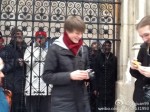
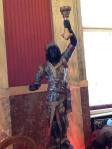
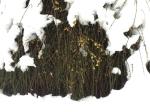
We had a vote about our military in Austria on the weekend. And a demonstration for refugees on hunger strike. Complete with a huge Sachertorte. For the protesters. In commemoration of the “Lichtermeer” against racism and xenophobia in Vienna 20 years ago. I didn’t know if I was going to vote, on Sunday morning. So I got Jackie to call our old friend, Gen. A., her employer in Beijing. The Social Democrats wanted to abolish the draft. But some prominent Social Democrats wanted to keep it, incl. the president. General A. is Social Democrat. But he said if the draft is abolished, they will only get certain segments of the population as recruits. You can do all sorts of other things instead of going to the army. Work in a hospital, teach German to refugees (what I did), even go to Qiqiha’er 齊齊哈爾 for a year. (Here is another report in German, translated from 齊齊哈爾日報)。 It’s not that bad if every healthy young man is required to do something for the community. That was my reasoning. When I did that alternative community service thing, we had to do some training at first for being able to help in case of floods, storms etc. That boat thing was fun. The guy in our group whose parents were in the far-right Freedom Party volunteered and was the first to try and row to an island in the icy Danube. Boat leaked. He didn’t get very far. They sent him to hospital. He was ok. Later on he had to teach German to refugees, helping me. He wasn’t bad, they liked him. He really tried, and I’m quite sure his attitude to refugees etc. changed.
标签:austria, civil rights, civil society, democracy, demonstrations, Europe, migrants, military, news, police, politics, refugees, society, solidarity, Vienna
发表在 January 2013, Uncategorized | 1 Comment »
4月 8, 2011

Interesting. Please click on the Global Times link (also at the bottom), read the article and then click on the “Related” links under the article. These other stories add a lot of perspective, through earlier and mostly positive Global Times coverage of Ai Weiwei’s various projects and activities. I remember seeing Lian Chan 連戰 on TV in Taiwan in the 1980s*. He was prime minister then, I think. Kept saying “Yi fa bali! 依法辦理”. To be handled according to law. Everything should be handled according to law. This was already after martial law 戒嚴 was lifted 解嚴 in 1987. But many opposition figures and activists were still in prison (they had a prison island, “Green Island” 綠島, for example) or barred from returning to Taiwan. Martial law had been lifted, but many laws from the One-Party-rule were still on the books, and actually still enforced (See the poem “After Martial Law Was Lifted – In Commemoration of Lifting Martial Law in Taiwan on July 15th, 1987” by Li Qin’an [李勤岸 – 解嚴以後 – 一九八七年七月十五日臺灣解嚴紀念] http://blogs.yahoo.co.jp/dujuan99nihon/30163376.html). Now which law is the Global Times article referring to? Let US bake our cake of social progress and eat it at the same time, and have it OUR way, and let nobody in the world talk too much about it, because this is the LAW. Right?
Very interesting how they keep on contradicting themselves. “Was said to have been detained”. Was he, or was he not? Maybe just kidnapped? “It was reported his departure procedures were incomplete.” Interesting. So which law will not concede before Ai Weiwei? Which departure procedures law? No, it’s THE LAW. Shoot first, deflect questions later.* Happens in every society.
Martin
======================================
Global Times (4/6/11):
http://en.huanqiu.com/opinion/editorial/2011-04/641187.html
Law will not concede before maverick
法律不会为特立独行者弯曲_评论_环球网: http://bit.ly/hwH7G4, most discussed on @dujuan99/china (http://bit.ly/evC5Ka) See also China Geeks (4/8/11).
魏京生: 从艾未未事件看中国法制的演变
Geremie Barme on Ai Qing and Ai Weiwei
Nude photos and other incriminating activities of Ai Weiwei
It’s really very simple, and even seems a bit tedious when you think about it. Yet I go on watching these shows. What else would you have me look at, dear readers?
Salman Rushdie
Who is afraid of Ai Weiwei?(Language Log)
貝嶺:裸體公民艾未未 (China Times, also in Ming Pao)

Photo by Katharina Hesse
There are many relations of this case to other arrests like the one on April 8 of Zhao Lianhai 趙連海, speaker for parents whose children had been poisoned by tainted milk.
Zhao had been released on parole after beeing imprisoned for “disturbing the peace”. But on April 6, he uplaoded a moving video, holding his child and trying to make a public statement at home.
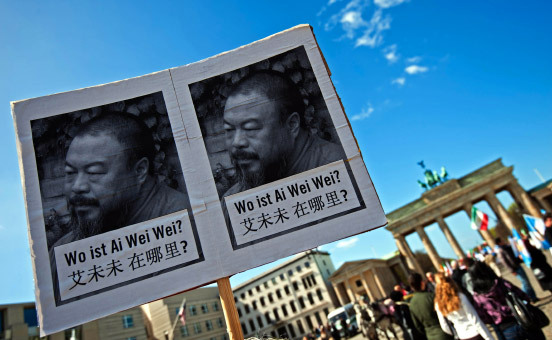
*This blog entry started out as a post on the MCLC email listserv. A lively discussion ensued. Andrew Field pointed out that Lu Xun 魯迅 and many other modern writers were banned in Taiwan under martial law. James Dew, Tim Wong, Kirk Denton, Christopher Lupke and others remembered how foreign students read these writers in a special room at Taiwan University, and how Chen Yingzhen 陳映真 connected to Lu Xun and the May Fourth tradition. Chen was imprisoned for “pro-communist activities”. Tai Jingnong 台静农 (1903~1990), a well-known writer and painter in Taiwan, was originally a student of Lu Xun.
* Jerome Cohen uses a similar expression in the South China Morning Post (4/27/11): “Second, it also seems clear that, whatever the evidence being assembled about tax evasion or other charges, this was not the motivation for Ai’s detention. This case started out on a ‘detain first and look for justification later’ basis.”

 Chinese rock music related to Ai Weiwei: http://www.zuoxiaozuzhou.com/, via Jeroen Groenewegen
Chinese rock music related to Ai Weiwei: http://www.zuoxiaozuzhou.com/, via Jeroen Groenewegen
标签:Ai Weiwei, art, china, civil rights, 环球时报, 纽约, 艾未未, 裸照, 魯迅, 贝岭, FAZ, Global Times, Hong Kong, human rights, law, lawyers, Lu Xun, martial law, May 2011, Ming Pao weekly, nude pictures, nudity, prison, protests, rights, taiwan, 明報, 法兰克福汇报
发表在 April 2011, May 2011, Uncategorized | 3 Comments »
4月 5, 2011

Stichworte Lesung 12.4. Gerhard Ruiss – Bei Ling
Verhaftungswelle – Ai Weiwei, vorher schon andere Künstler wie Wu Yuren; auch Ran Yunfei und viele andere Blogger, Teng Biao und viele andere Menschenrechtsanwälte …
Gao Zhisheng (Anwalt) seit Jahren verschwunden, vorher mehrfach inhaftiert und gefoltert
Viele unter Hausarrest und abgeschirmt, in letzter Zeit verschärft, auch Liu Xia, Frau von Liu Xiaobo.
Seit Oktober durfte niemand Liu Xiaobo besuchen, auch seine Frau nicht. Falls Bruder oder Eltern doch einmal hindurften, dann unter Geheimhaltung, alles abgeschirmt, jeder Kontakt nach außen wird strengstens verhindert.
Liu Xianbin wurde letzte Woche wieder zu 10 Jahren wegen Anstiftung zur Untergrabung der Staatsgewalt verurteilt. Seit 1989 bekam er insgesamt 25 1/2 Jahre, u.a. wegen Gründung einer Oppositionspartei. Solche wie ihn gibt es noch mehrere, sie sind halt alle nicht so bekannt wie Liu Xiaobo. Liu Xianbin kam erst 2008 frei, unterschrieb aber sofort die Charta 08 und wurde 2009 wieder erhaftet. Er hat eine Tochter im Teenageralter, die ihren Vater hauptsächlich von Besuchen im Gefängnis her kennt. Es gibt einen sehr interessanten Text von Liu Xianbins Frau Chen Mingxian (leider nur auf Chinesisch), in dem sie von ihrem Leben seit 1995 erzählt. Sie ist einfache Lehrerin, lernte zufällig Liu Xianbin kennen, wurde langsam in die Dissidentenszene hineingezogen, beschreibt sehr eindringlich ihr tägliches Leben in einer kleineren Stadt, mit häufigen Polizeibesuchen.
Seit Februar gibt es im Internet Aufrufe, in 10-15 Städten auf die Straße zu gehen, jeden Sonntag, gegen hohe Lebensmittelpreise, Korruption und viele Misstände; ohne Transparente, einfach Spazierengehen an bestimmten Orten, höchstens manchmal Sprechchöre; darauf wird jedoch mit großem Polizeiaufgebot, Brutalität und vielen teils willkürlichen Verhaftungen reagiert.
Der Dichter Liao Yiwu, der 1989 wegen einer Radioausstrahlung seines Gedichts “Massaker” ins Gefängnis kam, die 90er Jahre hauptsächlich in Lagern verbrachte, dort viel Stoff für Reportagen und Erzählungen fand, die auch ins Deutsche übersetzt wurden, und von einem alten Mönch Flüte spielen lernte, durfte im Herbst 2010 erstmals ins Ausland, nach den Solidaritätslesungen am 20. März (Tag der politischen Lüge, Authors for Peace, Internationales Literaturfestival Berlin) und nachdem sich sogar Angela Merkel für ihn einsetzte. September und Oktober 2010 war er in Deutschland, dann ging er zurück nach Sichuan. Sofort wurde er wieder überwacht, öfters zur Polizei beordert, etc. Heuer wurde er in die USA zu einer Lesereise eingeladen, durfte aber im März wieder nicht ausreisen. Auf diese Weise wird er auch die folgende Reise nach Australien, wo er dasselbe Buch vorstellen sollte, nicht antreten können. Seit den 90er Jahren wurde er 16 Mal in verschiedene Länder zu literarischen Veranstaltungen und Konzerten eingeladen, 1 mal (im Vorjahr) durfte er ausreisen, 15 mal nicht. Liao Yiwu ist nicht das einzige Beispiel; der Dichter Bai Hua durfte lange Zeit ebenfalls nicht ausreisen; ich habe noch von anderen Fällen gehört.
Zhao Wei, der Student, der unlängst auf einer Zugfahrt umkam, ist auch ein Fall, der einen an viele ähnliche Fälle erinnert, von denen man ebenfalls in China gehört hat.
Liu Xiaobo, Ai Weiwei und Bei Ling kennen einander aus den 80er Jahren. Alle Künstler, Musiker, Schriftsteller etc., die jetzt über 30 sind, sind durch das Proteste-Desaster und Massaker von 1989 miteinander verbunden, auch wenn sie künstlerisch, intellektuell etc. überhaupt nicht miteinander übereinstimmen. Dissidenten, auch im Ausland, sind teilweise sehr zerstritten. Liu Xiaobo wird von manchen nicht als geeignet angesehn, die Arbeiter, ArbeitsmigrantInnen etc. zu vertreten, die in den letzten Jahren mit Streiks, Selbstmorden und schon länger auch durch die vielen Arbeitsunfälle in den großen Fabriken in den Industriestädten um Kanton und anderswo von sich reden gemacht haben. Aber auch da gibt es eine Verbindung: Zheng Xiaoqiong, die Arbeitsmigrantin und Dichterin, die 2003/2004 bekannt wurde. 2009 kam eine Auswahl ihrer Gedichte in Taiwan heraus, in einer Serie, in der auch Gedichte der tibetischen Schriftstellerin Woeser erschienen. Am 5. April 1976 begann die Öffnung Chinas, noch vor Maos Tod, auf dem Tian’anmen-Platz mit Gedichten. Auch heute ist Lyrik bedeutender und integrativer, als man glauben möchte. Natürlich ist nicht alles davon immer ‘nur’ Literatur – Kunst und Politik sind in Wirklichkeit weiterhin sehr eng miteinander vebrunden, auch wenn seit den 90er Jahren alle sagen, alles sei nur noch kommerziell geworden. Unter Mao war allles Politik. In den 80er Jahren waren die Verbindungen noch sehr deutlich. Jetzt sind sie auch sehr deutlich, wenn man die Nachrichten hört.

12.4. 19 Uhr
Lesung mit Gerhard Ruiss und Bei Ling (Lyriker, Essayist, Dissident, Biograf des Friedensnobelpreisträgers Liu Xiaobo)
–
Raum D / quartier21
Gedichte von Liu Xiaobo und Liu Xia
Auszüge aus Essays von Bei Ling und aus der Biografie von Liu Xiaobo
Gedichte von Bei Ling
Es lesen Gerhard Ruiss (IG Autorinnen Autoren) und Bei Ling
Nach der Solidaritäts-Lesung für den inhaftierten chinesischen Friedensnobelpreisträger Liu Xiaobo am 20. März (mit Gerhard Ruiss im Radio – siehe
http://archiv.literadio.org/get.php?id=766pr1602) kommt sein Biograf Bei Ling zu einer Lesung nach Wien ins Museumsquartier. Der Versuch der Überwindung von Zeit und Raum ist für Bei Ling seit mehr als einem Jahrzehnt bittere Realität. Der Lyriker war – wegen der Veröffentlichung einer Literaturzeitschrift – selbst in Haft, wurde 2000 auf internationalen Druck hin freigelassen und aus China ausgewiesen. Seither lebt er im Exil.
„Es gibt keine Wahl mehr. Das Blut vieler junger Menschen, jene Seelen, jene eingekerkerten Menschen, und dann noch Xiaobo im Gefängnis – er wird mich verfolgen und auch das, was ich schreibe. Er wird mein Verhalten bestimmen“, das schrieb Bei Ling vor 22 Jahren als er erfuhr, dass sein Freund Liu Xiaobo nach dem Massaker vom 4. Juni 1989 verhaftet worden war – und er scheint recht behalten zu haben. Die Biografie seines Weggefährten Liu Xiaobo ,Der Freiheit geopfert´ ist erst kürzlich auf Deutsch erschienen.
Am 12. April liest Bei Ling mit Gerhard Ruiss Gedichte von Liu Xiaobo und Liu Xia (der Frau des inhaftierten Nobelpreisträgers, die seit Oktober in ihrer Wohnung festgehalten wird). Außerdem trägt Bei Ling aus seinem lyrischen Werk vor und liest aus der Biografie über den Friedensnobelpreisträger.
Die Veranstaltung in Kooperation mit dem quartier21/ MQ wird von der IG Autorinnen Autoren mitgetragen.
Der Freiheit geopfert. Die Biografie des Friedensnobelpreisträgers Liu Xiaobo
© Angelika Burgsteiner und Martin Winter
Martin Winter
0043-650-7209592
标签:art, china, civil rights, detention, disappearance, human rights, law, lawyers, literature, poetry, politics, prison, rights
发表在 April 2011, Welcome! | Leave a Comment »
2月 22, 2011
As rich European countries go, maybe Austria is just as bad as Italy or France. Only smaller, more provincial. Newest anti-foreigner laws package passed on Tuesday, Feb. 22nd, 2011. The protesters in Egypt didn’t really look to America or Western Europe, but to protest experiences in Serbia and such. At least that’s what I remember from reports in the NY Times, among others. A Chinese friend told me he was watching the Arab protests very much,while he was in Europe, because the pictures from Egypt reminded him of Beijing in 1989.
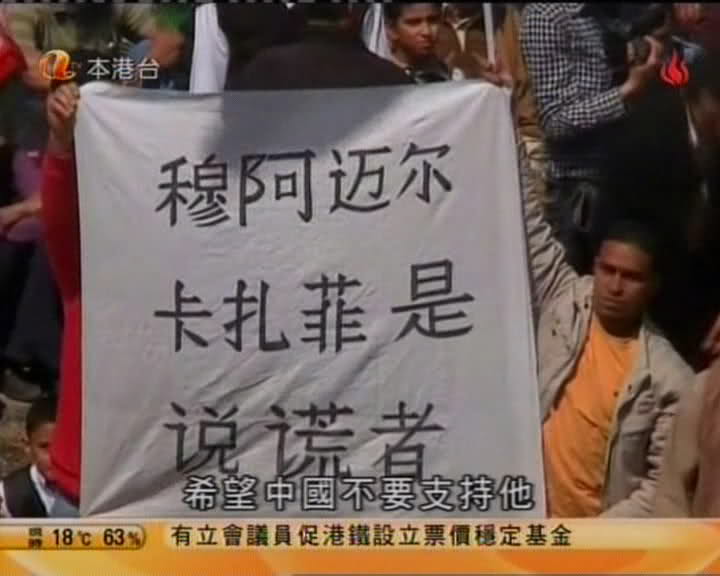 China has had too many so-called revolutions under Mao and a big failure with protests for civil rights and democracy in 1989. But there are many protests in China all the time. Labor unrest, land seizures, health hazards etc.. There may also be a big craving for stability, hence the hesitation to participate in larger protests. The op-ed in the NYT (IHT) by Daniel Bell, designated Western politics professor in Tianjin, was very academic. Or very wishy-washy. Civil rights are universal. No, China’s not so special. Reporters know, especially when they go to see the blind Women’s rights activist lawyer in Shandong and get waylay-ed and beaten. No, nobody cares about supposed academic discussions on why democracy might not work. Yes, people try to lead a good life, individually, for their family, and sometimes they notice the limits, and try to work around them, and many do talk about it. Sorry for the rambling. As I said, rich countries are no beacons. Maybe I am more politics-sensitive than before, since we moved back to Austria from China, after 10 years in Beijing and a few more in other cities. Roger Cohen is right, the EU doesn’t look very good at all these days.
China has had too many so-called revolutions under Mao and a big failure with protests for civil rights and democracy in 1989. But there are many protests in China all the time. Labor unrest, land seizures, health hazards etc.. There may also be a big craving for stability, hence the hesitation to participate in larger protests. The op-ed in the NYT (IHT) by Daniel Bell, designated Western politics professor in Tianjin, was very academic. Or very wishy-washy. Civil rights are universal. No, China’s not so special. Reporters know, especially when they go to see the blind Women’s rights activist lawyer in Shandong and get waylay-ed and beaten. No, nobody cares about supposed academic discussions on why democracy might not work. Yes, people try to lead a good life, individually, for their family, and sometimes they notice the limits, and try to work around them, and many do talk about it. Sorry for the rambling. As I said, rich countries are no beacons. Maybe I am more politics-sensitive than before, since we moved back to Austria from China, after 10 years in Beijing and a few more in other cities. Roger Cohen is right, the EU doesn’t look very good at all these days.
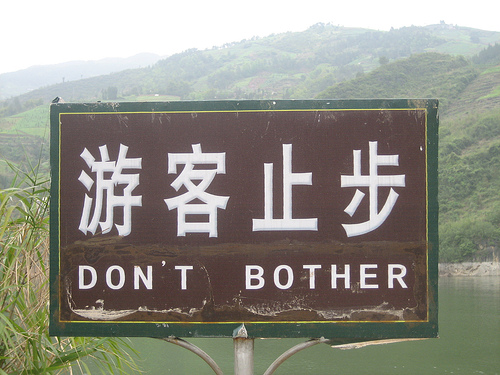
Don't bother
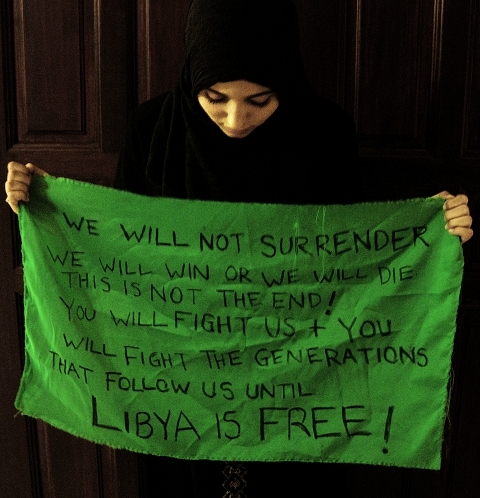
标签:1989, 2011, activists, Africa, austria, beijing, china, civil rights, civil society, democracy, Egypt, Europe, law, lawyers, Libya, life, politics, Tunisia, Xenophobia
发表在 February 2011 | 1 Comment »
1月 17, 2011
Liu Xiaobo, the Chinese dissident sentenced to 11 years on Dec.25th 2009 for “inciting subversion“, was awarded the Nobel Peace prize in absentia in Oslo on Dec. 10th, 2010. Liu’s old friend and Independent Chinese PEN co-founder Bei Ling has written a biography of Liu Xiaobo. Bei Ling started off from an essay he wrote in June 1989 in New York, after Liu Xiaobo had been arrested in Beijing in the aftermath of the massacre throughout the city, as People’s Liberation Army troops forced their way through the streets blocked by protesters in the last phase of the demonstrations on Tian’anmen Square. Liu Xiaobo had returned to China from New York and led a hunger strike of intellectuals on the square, supporting the students and Beijing residents in their demands for civil liberties. Bei Ling‘s essay from 1989 was re-published in Chinese in Hongkong and Taiwan in June 2009, and in the German newspaper FAZ on October 12th, 2010, a few days after the Nobel Peace prize announcement from Oslo. Soon after, the German publisher Riva expressed interest in a biography of Liu. Bei Ling had recently written a literary memoir of his years a Beijing underground poet in the 1980s and a literary magazine editor, shuttling between China and foreign countries, in the 1990s. Liu Xiaobo and other old friends such as Liao Yiwu are important figures in Bei Ling’s memoir, to be published by Suhrkamp in Germany this year. So Bei Ling was ready to write his biography of Liu Xiaobo on short notice. It was a crazy idea, but it worked. We worked around the clock in November 2010, and in early December the book hit the shelves. In the first week, from Dec. 9 to 16, it sold 2500 volumes, according to the publisher. Since then, Bei Ling’s biography of Liu Xiaobo has been reviewed in many newspapers, magazines, on TV and radio stations etc. throughout Germany and in neighbouring countries. This month (January 2011), according to the publisher, the book has started to appear on the Spiegel magazine’s bestseller list, the standard list in the German-speaking realm. On January 11th, 2011, a symposion with Bei Ling, Prof. Weigelin-Schwiedrzik, Prof. Findeisen, Prof. Zhu Jiaming, Dr. Felix Wemheuer and others was held at Vienna University and met with great interest among students and teachers from various faculties. See here …

Liu Xiaobo biographer Bei Ling at Vienna University on Jan. 11th, 2011. Photo: Angelika Burgsteiner
标签:11 years, censorship, china, Chinese Studies, civil rights, civil society, freedom of speech, intellectuals, literature, Liu Xiaobo, Nobel Peace prize, politics, prison, prisoners of conscience, reporting, subversion, Vienna University, writing
发表在 January 2011, Translations, Uncategorized, Welcome! | 5 Comments »
12月 10, 2010
This is a book about an absent person, who is held in prison; who has won a Nobel Peace prize and is not allowed to collect it: Liu Xiaobo. His old friend Bei Ling writes about him. He draws a many-faceted picture – only a knowledgeable friend can do that. This book is concerned with manifestos, petitions, political actions, but also with self-doubt and guilt, stubbornness and ambition. The author Bei Ling, who was imprisoned himself before, sees his duty in painting a complicated picture of this civil rights activist, with many different shades and colors. Bei Ling knows that he can see Liu Xiaobo only from one side, he can only portray him in profile, not from the front. But even if it is only part of a bigger picture, this part shows us a whole cosmos of courage and repression, of labor camps and life outside watched by security agents, like the life that the wife of this civil rights activist is forced to lead. This book offers a lot of information, but it doesn’t explain everything, because it wants you to keep asking questions. This is why I think everybody should read it.
Elfriede Jelinek, Tr. MW
Read more …
Liu Xiaobo biography published
My essay on Liu Xiaobo and the new biography
Translating the bio
Liu Xiaobo and 1984

标签:1989, Bei Ling, biography, china, Chinese literature, civil rights, constitution, diplomacy, Elfriede Jelinek, government, human rights, law, literature, Liu Xiaobo, memory, Nobel Peace prize, philosophy, poetry, politics, prison, Tian‘anmen, translation, writers
发表在 November 2010, Translations | Leave a Comment »










































 China
China


